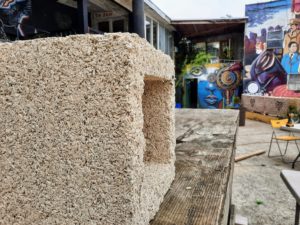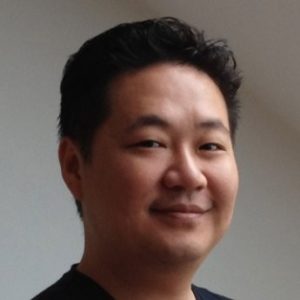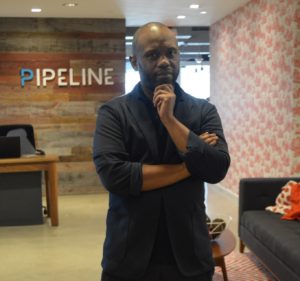
[ad_1]
Philadelphia is on the road to becoming a smart city — and the still ongoing pandemic may have sped up the technological transformation.
Cultural Economist Dr. Jamie Bracey-Green‘s recent West Philly launch of Think and Grow Farms urban agriculture movement seeks to address food insecurity by bringing food closer to the people who need it the most.
And, in light of the still-ongoing pandemic, it also may become a necessary survival strategy. The Department of Public Health‘s 2019 Health of the City reported over 980,000 Philadelphians live in neighborhoods with an excess of unhealthy food. Most of these residents are Black (45%,) followed by white (27%) and Latino (17%).
Philly’s first Think and Grow Farm is a converted freight container that sits at the One Art Community Center‘s edge. Ten-foot high bamboo stalks line the entrance providing lush cover that leads into an expansive and quiet garden space that belies its neighbor, the North 52nd Street business corridor. Culturally centric murals grace the walls and serve as a backdrop to the Black Cannabis Week stage area. Positioned front and center is a single masonry brick made of the biocomposite insulation, Hempcrete.
“Hempcrete is a combination of the inner woody core of the industrial hemp stalk. It’s a wonderful alternative to traditional installations and highly performant,” explains Cameron McIntosh of Americhanvre Cast Hemp and head of the All Together Now Industrial Hemp Coalition. He’s focused on improving existing housing with hemp-based modular structure with both function and form in mind.
As one wanders about 100 yards from the stage — past the chicken coop where several hens are scurrying, a rooster is audibly marking his turf, and three ducks cast a wary eye at passing ankles — and herein lies the treasure.
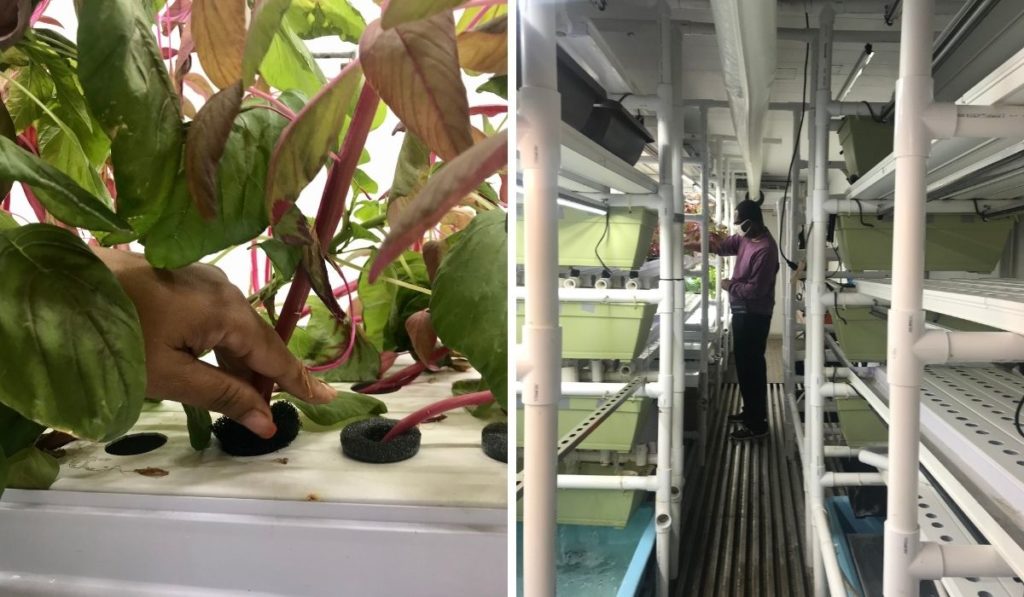
Think and Grow Farms is an example of speculative tech and innovation in West Philly. (Photos by Bobbi Booker)
Bracey-Green opens the door to the nondescript Think and Grow Farms, an artificial environment that’s akin to Mother Nature on steroids. Bracey-Green can reconfigure the plants into several full harvest cycles in a single year by raising plants indoors under high tech lighting and irrigation systems. Throughout the process, her team (which includes husband, Mark) is tweaking the hydroponics and aquaponics, creating a symbiotic environment for plants and fish.
An advocate for greater equity in S.T.E.M. fields, Bracey-Green launched the Center for Inclusive Competitiveness at Temple University and heralds underrepresented youth in local, national and global innovation economies.
“We’re using technology and agriculture — and I’m all about applying it for our food, energy, and water,” says Bracey-Green.
Her project employs agricultural technology and growing techniques honed in the legal compliant cannabis business. Bracey-Green adds that she is inspired by the legacy of George Washington Carver, the famous 20-century African American agricultural scientist whose many inventions include many uses for the peanut.
“We have an actual, literal farm inside a shipping container growing food to show our folk the technology,” said Bracey-Green . “And I think, again, the technology, the low tech, high tech part of it is easily accessible to [Black] folks. Anybody can do this, and it’s an entrepreneurial opportunity.”
To date, three Philadelphia projects have received grants from the Knight Foundation. The Neighborhood-Led Permitting informs residents about construction in their neighborhoods and Edit the City! allows residents to re-envision at their post-COVID-19 community. The Simulated Interactive Management of the City of Philadelphia (SIM-PHL) is a Philly-focused urban planning simulator developed by Drexel University‘s Entrepreneurial Game Studio (ESG) along with educator and game designer Dr. Frank Lee.
With Drexel University situated at the crossroads of several gentrification areas, Lee is aware of the struggles that face many low-income people residents of color.
“As always, with technology, there’s always going to be an issue of the divide: the haves and have-nots,” notes Lee. “For the most part, technologies are to help those who have access to that technology. So having and allowing access to everyone is going to be a problem that we have been struggling with, and will continue to struggle with: How do we provide these amazing new ways of doing things to everyone, not just the people who could afford it?”
Serial entrepreneur Tayyib Smith recalled that he had several testy encounters with the University City security force covering Drexel University and the University of Pennsylvania during his youth. In those days, he was a voracious reader who wanted to expand his knowledge base by visiting the campus library. Instead, he was blocked and escorted out of the buildings. Those memories helped shape the community awareness activism he espouses today.
“If you don’t have an understanding of contemporary technology, you’re food for the criminal justice system,” warned Smith. “People are making choices every day, and they don’t, in any way, shape, or form, understand how your phone is tracking you. You’re videotaped, like, 1,000 times between your job and your home. Any expenditure you make is tracked. If you get on a SEPTA bus and use a smart card, you’re being traced.”
West Philly is home for Jason Coles, founder/CEO of Katika, a new technology startup. He observed that many citizens, especially older Blacks consumers, were fast-tracked into tech integration to perform crucial day-to-day tasks amid the pandemic.
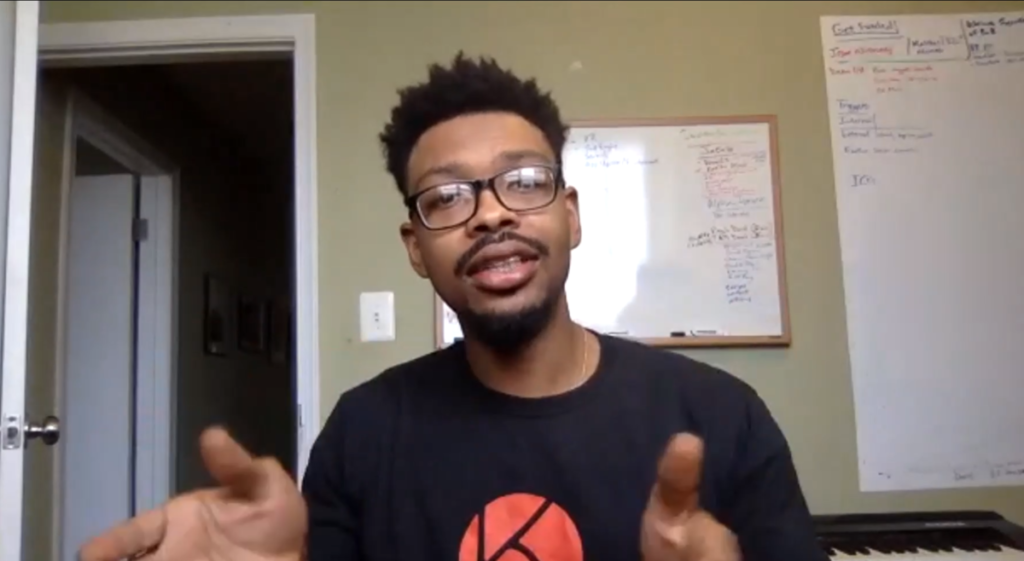
Katika founder and CEO Jason Coles during his Philly Tech Week 2020 event. (Screen capture from Zoom)
“Absolutely, you saw a hyper adoption rate to e-commerce of people that never bought anything online due to this pandemic. The world in which we live in 2020, everything is connected to tech, yet unfortunately, within our communities, we’ve had a digital divide,” Coles said. “Part of that comes from occupations in which historically if you weren’t in an office setting environment where you were forced to work on a computer, you may not have had those skill sets, and you couldn’t pass those on to your kids.”
“You know what?” he added, “my mom’s a teacher, but my dad’s a construction worker. So, she was more inclined on the computer to show me a couple of things. But he had no idea. So, not only do you have to implement these speculative technologies, but you also have that education component to bring everyone up to speed on what are these things that are coming into our neighborhoods? And how can we benefit from this?”
Afrofuturism, as defined by the Washington Post, is “the conscious practice of imagining what Black people could be in the future, grounded on who they were in the past. Who would we be if we remembered who we were?”
Afrofuturism aesthetic appears in the literature of Martin R. Dulany and Octavia Butler; the music of Sun Ra and George Clinton, and most recently, on the big screen in Marvel’s, Black Panther. Its message is simple: know your glorious past while you plan for a bright future.
Although Bracey-Green is not a part of the Knight Foundation initiative, she is part of a growing list of innovative thinkers who use localized technology to benefit community members. After obtaining her doctorates at Temple University, her research has taken her worldwide, especially to Africa, to consult with urban planners on the myriad of ways to use speculative tech.
“In Tanzania, they’re talking right now about how you plan these cities because self-driving cars are really about using less gas, less electricity, less power, and easing up on the power grid,” shared Bracey-Green of her recent trip.
“In the kind of old city like Philadelphia, incorporating technology provides an opportunity for people to look at the future,” she added. “Smart cities are coming; it’s a matter of whether Black folk can be a part of it and what is accessible to us to be a part of.”
-30-
[ad_2]
Source link
